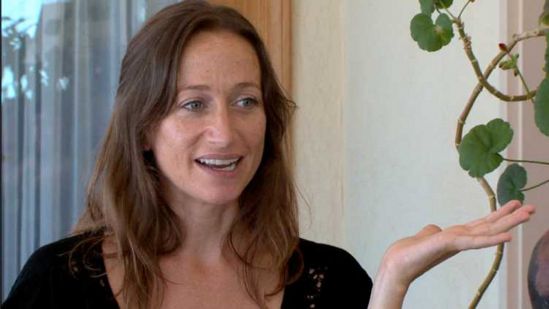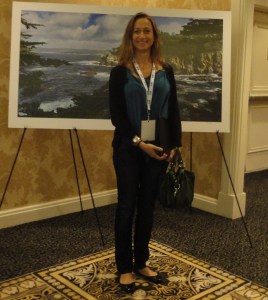Celine Cousteau, the explorer, needed directions. The hallways and meeting rooms at the Hyatt in St. Petersburg can be tricky. Not tricky like a murky fork in a waterway in the Vale Do Javari in the Amazon, where she filmed “Tribes on the Edge.” But one wrong turn and, well, the next thing you might be standing in line at the hotel’s Starbucks.
 Cousteau got directions and padded down a hallway. Now she was in search of an answer. “The question is, ‘So what?’” Cousteau said in the warm manner that made her grandfather, Jacques Cousteau, a television natural. “So you made a film. So what?” She said filmmaking is meaningful only when it aspires to make a human difference. "Does it move the needle and empower people?" she said.
Cousteau got directions and padded down a hallway. Now she was in search of an answer. “The question is, ‘So what?’” Cousteau said in the warm manner that made her grandfather, Jacques Cousteau, a television natural. “So you made a film. So what?” She said filmmaking is meaningful only when it aspires to make a human difference. "Does it move the needle and empower people?" she said.
Cousteau found the meeting room, cryptically called HTC#3, and it was filling up. Mohamed Nasheed, the former president of the Maldives and a big Celine Cousteau fan, was already inside, anticipating Cousteau's 45-minute program at the Blue Ocean Film Festival and Conservation Summit.
“I’m an optimist,” said Nasheed, who in 2008 became the island nation’s first democratically elected president. “I believe the planet can be saved.”
 Cousteau said she believes in saving people. She founded CauseCentric Productions to help support shoestring filmmakers and spark grassroots action through documentaries.
Cousteau said she believes in saving people. She founded CauseCentric Productions to help support shoestring filmmakers and spark grassroots action through documentaries.
“We need to care for our species,” Cousteau said. “More is expected of you as a filmmaker than ever before. The film industry as a whole has incredible capability to inspire people through stories.”
Cousteau was 10 when her grandfather, Jacques, started exploring the Amazon River for a series of television films from 1982-1985. She said her passion for indigenous people springs from her experience as a passenger aboard the Calypso.
In 2010, she started working on “Tribes on the Edge.”
“I received a request from one of the indigenous people who said we want you to tell our story to the world,” Cousteau said. “They realize that global knowledge of their existence will help them to survive. Because if you don’t know someone exists, they disappear.”
The tribes were dying because of a health crisis that seemed unnoticed by Brazil and the world community, Cousteau said.
“So for them having a film that tells their story creates a global awareness that they exist,” Cousteau said. “That they are people, they exist, and that gives them hope.”
Cousteau's short efforts include "Sirenia: Mystique of the Manatees" that she filmed in the Crystal River. CauseCentric also produced "Lionfish: Eradication and Lunch" for the MesoAmerican Reef Leadership Program.
She said she avoids public rallies and demonstrations of advocacy in favor of storytelling. Her dilemma as a filmmaker, she said, is which fights to pick.
"Our days are filled with trying to tell stories about issues and challenges, and to find ways of creating solutions and empowering people,” Cousteau said. “That inspiration is also contagious. We try to create content that inspires people to do something.”
Cousteau said she carves a path around politics. She shuns action groups and reserves her energy for film.
“I have chosen to stay out of politics. I also feel at this point in my life, it’s just not where I exist,” Cousteau said. “I don’t exist in that medium. I don’t speak that language. I would have to learn that language in order to be able to function well within it."
But Cousteau also acknowledges her DNA. Born in California and raised and educated in France and in the U.S., she is fluent in three languages. She is a member of the World Economic Forum Council on Oceans and is on the board of Plant a Fish and Adventurers and Scientists for Conservation.
“I’ve seen two previous generations of my family go from the exploration and storytelling aspects to much more environmental law and political change,” Cousteau said. “So I’m not going to rule it out, that in the third part of my life I may gravitate toward politics. But right now it’s not me.
“That ability to create hope in people is really powerful. It gives them resilience, it gives them dignity. And it gives them something to live and fight for. And this has engulfed me completely.”
Outside
Bitcoin mining emissions in China will hit 130 million tonnes by 2024 https://t.co/w6He7so8N2 pic.twitter.com/qYUDtBdeRK
— New Scientist (@newscientist) April 9, 2021
The Gunk Report
For the Blue-Green Algal Bloom Weekly Update from the Florida Department of Environmental Protection, tap here. For DEP's Algal Bloom Sampling Map, tap here.
What, me worry?
» "PLAYING WITH SHARKS," which recently premiered at the Sundance Film Festival, documents diving legend Valerie Taylor.